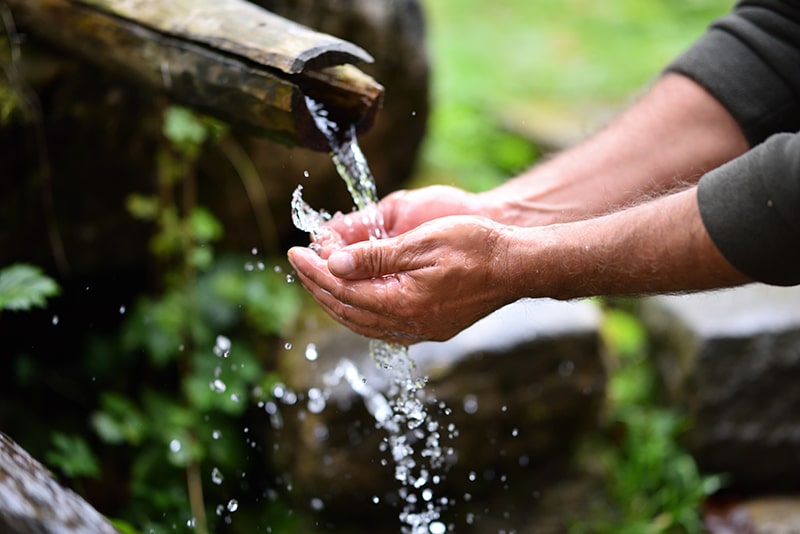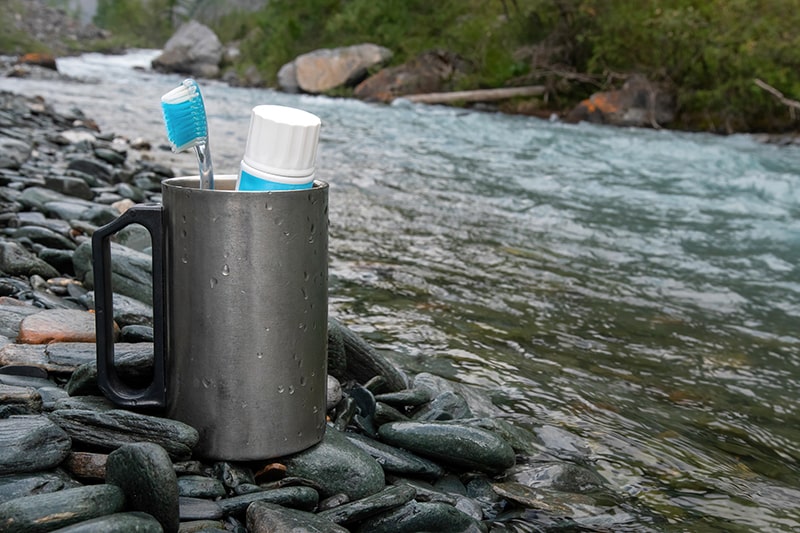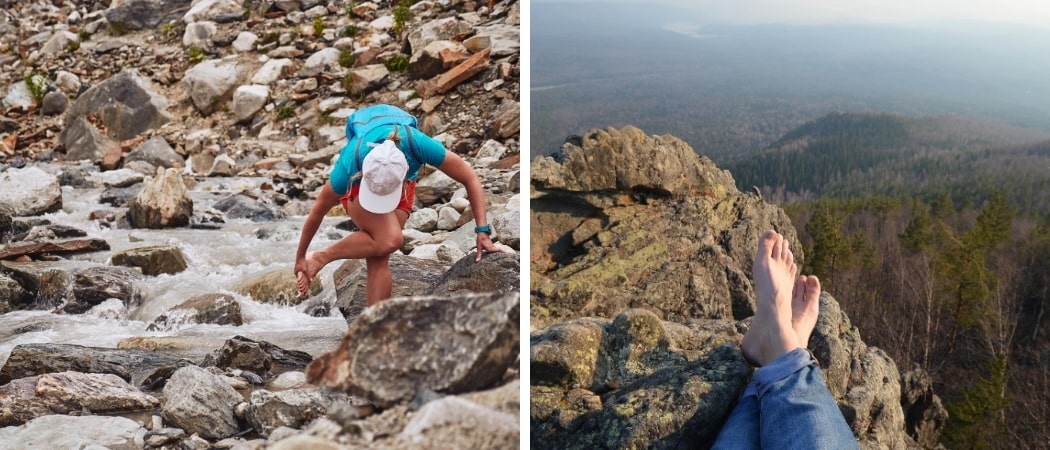Many avid hikers will tell you that hiking in the wilderness is, by far, the most enjoyable experience. Therefore, if you plan a weekend getaway or even a more extended hiking excursion, you might wonder, and rightfully so, about how to stay clean when hiking.
Furthermore, it is paramount that you stay healthy if you want to get the most out of your outdoor adventure. To keep clean and healthy while on the trail, you need to exercise proper hygiene.
For that reason, I listed in this post some guidelines to which you ought to adhere to and refer to as you explore the backcountry to avoid getting sick.
Now the question becomes, what to pack to stay clean while on your hiking trip without carrying a heavy load?
What to Bring for Proper Hygiene
To help you keep your hiking backpack lightweight, I have listed some of the do’s and don’ts and some items needed for proper hygiene while in the wild.
DO’S
Must-have products for proper hiking hygiene are baby wipes or moist towelettes, hand sanitizer, biodegradable soap, and a camp trowel (for bathroom purposes).
You should opt for biodegradable toilet paper if you intend to bury it. Put the toilet paper in a separate Ziploc bag and extra bags if you have to repack the toilet paper after use.
If you plan to bring baby wipes, and moist towelettes, you must pack up the used ones in a plastic bag, as you can’t dispose of them in the wild.
Also, pack a bandana and a microfiber rag.
A travel-size toothbrush and toothpaste along with the floss!
Pack all your toiletry products in a Ziploc bag. Why? Because the bag is transparent, it makes your life easier when looking for something specific.
Place the toiletry bag in the front pocket of your backpack for quick access to your items.
On the other hand, some things are a big no-no on your hiking trip, as well as some items you ought to leave at home.
Here they are below:
DON’TS
Don’t pack scented products (deodorant, wipes, perfume, etc.). You will attract unwanted attention from wildlife, especially bears.
Don’t lather up in a stream or a lake even with biodegradable soap.
Don’t wear clothing made of cotton fabrics. Opt instead for synthetic materials. It helps wick moisture away from your body and dry faster than cotton.
Now, you should focus on four areas for proper personal hygiene in the backcountry which are listed below:
How to Stay Clean When Hiking — Personal Hygiene
Hand Hygiene
Packing hand sanitizer in your hiking backpack is a good idea because it can serve multiple purposes.
It can be used when going to the bathroom, cleaning the dishes, or taking a sponge bath, to only name a few usages.
However, you should not solely rely on hand sanitizer for cleaning your hands.

For sure, the alcohol contained within the sanitizer will kill bacteria. Still, it will also cause skin dehydration, cracking, and bleeding skin if you use too much. Thus, creating the perfect environment for bacterial growth. A combination of hand sanitizer and some soap should be used instead.
It is recommended to wash your hands before cooking, before meals, and after going to the bathroom. If you don’t wash your hands regularly, this will increase the chances of getting sick while on your hiking excursion.
Always use biodegradable soap, like Dr. Bronner’s liquid soap, along with clean water, especially if you have hand-cracked skin and hand injuries. Dry your hands using a microfiber towel or bandana.
Dental Hygiene
Even while on the trail, no matter if it is for a weekend getaway or a long hike, you should not neglect your dental hygiene.
You should brush your teeth and yes, make your dentist happy, floss as well!
By doing so, your fellow hikers won’t run away from you on the trail because of your bad breath!

Feet Hygiene
Your feet are a pivotal part of your hiking trip. To avoid any injuries such as painful blisters, or athlete’s foot occurs while hiking, you need to take good care of your feet.
The best way to have healthy feet is to keep them dry. Therefore, whenever possible while on the trail, take a break, take off your boots and socks, and let your feet breathe. If you can, soak your feet in cool water for a few minutes and dry them up using a microfiber towel.

If you are unable to give your feet some fresh air during the day, you must do so at night before going to bed.
Also, I highly recommend that you put on a pair of dry clean socks for sleeping. Don’t sleep with the dingy socks that you wore all day!
When going on a multi-day hike, pack three pairs of socks in your backpack: one to wear, one for sleeping, and one as a backup.
At the end of each day, I also wash my socks and let them dry in my tent overnight. If they are still wet in the morning, I attach them to the front of my backpack to finish drying them out during the day.
Body Hygiene
When it comes to your body hygiene, you should always clean yourself before going to bed.
There are three ways you can go about cleaning yourself in the wilderness:
- Jump into a lake. Ensure you do so away from where you collect the water for the cooking and all your other needs. Don’t use soap.
- Take a trail shower. Use biodegradable soap, a washcloth, and some water to wash your face, armpits, groin, inner thighs, and feet. Always take your shower at least 200 feet (70 steps) away from any water sources and the campsite.
- Sponge bath. You can use either alcohol-gel sanitizer or moist towelettes or baby wipes. Focus on the following areas: groin, armpits, between your toes, and feet.
Always dry yourself no matter the method used for cleaning yourself with a microfiber towel.
As a rule of thumb, you should never sleep in the same clothes that you wore during the day. So, after you wash, put on clean and dry clothes, which also include socks.
By doing so, you will keep the inside of your sleeping bag clean and sleep better.
Watch the video below which summarize how to stay clean and healthy in the wilderness:
Final Thoughts
Here you have it! A simple guide to follow to stay clean and healthy when hiking.
What’s more, you can keep the proper personal hygiene in the wild without having to pack your entire bathroom in your backpack! Awesome, isn’t it?
If you have any questions or would like to share your tips and tricks on how to stay clean when on a hiking trip, please leave them below. I am looking forward to hearing from you.
Hello there,
On some hiking trips, I have washed my clothes by putting them into a ziplock bag with water to remove the dirt. However, I had read somewhere a long time ago that an alternative would be to add a small amount of baking soda to the water for washing your clothes. That seems to work better than just the water to reduce the ”stink” in a shirt that was worn for multiple days. The downside is that you need to rinse it to remove traces of baking soda, so if clean water is at a premium, you may not want to waste water for rinsing purposes.
Thanks for sharing this excellent article.
Well, baking soda seems to have multi-purposes. I have some hikers’ friend that uses baking soda to brush their teeth instead of using toothpaste. I personally find baking soda to be too abrasive for my teeth!
However, baking soda could be a solution for washing your clothes while in the outdoors. I prefer to use biodegradable soap instead.
Hello there!
This post about how to stay clean when hiking is amazing. I am sure that the insightful information that you provide here will be of great help to anyone who comes across it as it is to me.
It doesn’t matter if you bring toilet paper, paper towels, or use natural materials like sticks and rocks. It is imperative to adhere to the ”leave no trace initiative”, so if it means that you have to bury everything using a camp trowel or pack it as the regulations require, so be it!
Thank you!
Thanks, you are right it is vital to take care of the environment by following the leave no trace initiative for the future generations.
Every few months, my mother talks about wanting to go hiking and camping. Sometimes she goes, sometimes she doesn’t. Regardless, your post about how to stay clean when hiking provides good advice. I will share it post with her.
She’s usually good about being prepared and staying clean, but I’m sure she wouldn’t mind some extra advice. I find that your post is relevant to anyone interested in hiking.
I find that what deter most novice hikers from going hiking is that they worry about personal hygiene on the trails.
This is why I provided this simple guide to help you stay clean when hiking and thus removing one more stomping block that prevents newbie hikers from going for a hike.